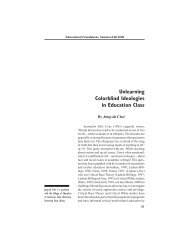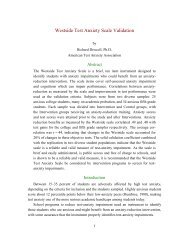Prison Literacy: Implications for Program and Assessment Policy.
Prison Literacy: Implications for Program and Assessment Policy.
Prison Literacy: Implications for Program and Assessment Policy.
Create successful ePaper yourself
Turn your PDF publications into a flip-book with our unique Google optimized e-Paper software.
eductions of from 30% to 80% in recidivism <strong>for</strong> follow-up periodsas long as fifteen years after program completion" (Ross &Gendreau, 1980, p. 1; Ross & Fabiano, 1983; Ross, 1990).Ross <strong>and</strong> Fabiano found that some prison education programsreduced recidivism whereas others seem actually to have increasedit. Premising their work on earlier studies, they attempted todiscern the difference between "programs that work" <strong>and</strong> thosethat do not, "on the basis of the presence or absence of specificcognitive components in the program" (Gendreau & Ross, 1983).Their highly selective criteria <strong>for</strong> inclusion were that a study had todemonstrate the following characteristics:conducted within an experimental or quasi-experimental designincluded follow-up assessment of delinquent or criminalbehavioryielded a statistical evaluation of outcome datawas judged <strong>for</strong> effectiveness on the basis of statisticallysignificant differences between the outcomes of the groups thatwere enrolled in the prison education programs <strong>and</strong> control orcomparison groups 35They found reports of 15 effective cognitive programs,35 of 10effective non-cognitive programs (7 of the 10 dealing withjuveniles),37 <strong>and</strong> of 1 ineffective cognitive program <strong>and</strong> 24ineffective non-cognitive programs.33 Their analysis of the data ledthem to conclude that "the effectiveness of programs wassignificantly associated with their use of cognitive training...E<strong>and</strong>that] how the offender thinks may be associated with his criminalbehavior <strong>and</strong> with his rehabilitation."39 Keeping in mind thesest<strong>and</strong>ards <strong>for</strong> cognitive effectiveness in a prison educationprogram that yields success in reducing recidivism, we have readreports of a number of other ef<strong>for</strong>ts that seem to offer furtherevidence of the success of this approach:10In the bleak world of scholarship about criminals, the news thata certain type of education can be statistically relied upon toreduce recidivism comes as a dazzling revelation. The conclusionsof Ross & Co., supported by Ryan, O'Neil, <strong>and</strong> others, adds up to anew hope <strong>for</strong> inmate habilitation <strong>and</strong> an emerging new theory ofeducation in prisons <strong>and</strong> jails.5 )34 TECHNICAL REPORT T193-1
















